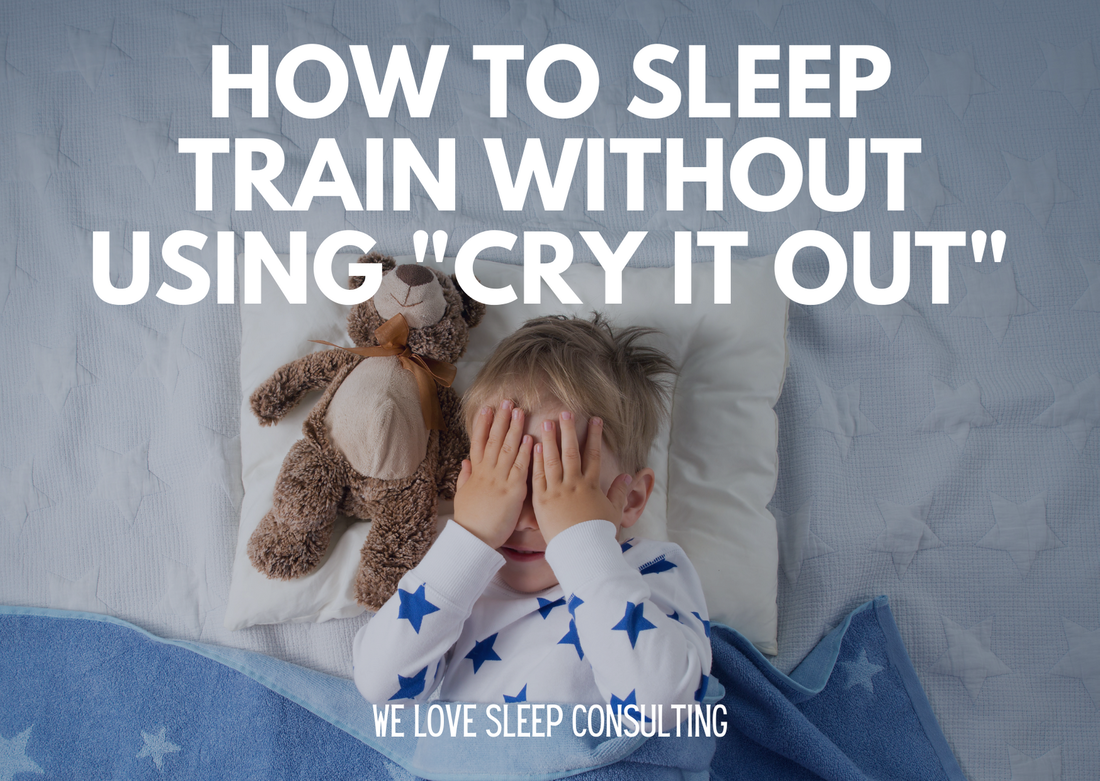|
The term "cry it out" has gotten a lot of attention, and even some backlash, as people debate over whether or not to use a technique known as "Extinction" when sleep training. All parents are nervous about hearing their child cry, and as a mother of two, I understand that! But sleep training does not always mean "Cry it Out" and it doesn't always mean your child will be alone, or will be crying for hours.
A few months ago, I talked with a young mom and self-employed business owner with a 7 month old baby boy. She had been feeding him to sleep and he was waking every 1-2 hours every night, and not napping well. She was terrified of hearing her baby cry, and after listening to my plan on day one of working with me, she seemed skeptical that it would work the way I said. The first night, as she executed the sleep training method with confidence, after the bedtime routine and a day of good naps, her baby cried on and off for 25 minutes, and woke only once in the night for a few minutes, then put himself to sleep. The next night, her baby fell asleep within minutes all on his own, with only a few minutes of light fussing, and he slept through the night and woke up happy at 7am the next morning. The next night, and from that night on, he went to sleep without any crying, and slept through the night. He started napping great and thrived on the new schedule, and it was life changing for this family! She had tried sleep training on her own before working with me, and didn't know which method to use or whether or not she was doing it right, and gave up after a few days with no success. She assumed sleep training meant "CIO" and she was afraid to leave her baby alone in a room to cry for hours. But with the right puzzle pieces fit together in the right way, sleep training was smooth and easy, and both baby and mother are happy and well-rested! If you're considering sleep training, and you're nervous about your child crying and you're wondering what method is right for you, here are some things to consider: 1. There is only one true "NO CRY SLEEP TRAINING" method and that is starting from the beginning, as you want to go on. I did this with both of my babies, starting from day one, and they did not need to "cry it out" later on. The reason babies or toddlers cry during sleep training is because they are protesting the change from breaking sleep associations (aka: sleep props) of things they have become dependent upon to get to sleep, such as rocking, feeding or nursing, being held, stroking a parent's arm, a parent's presence, etc. If you start out from day one laying your baby down awake and allowing them to go to sleep on their own without your help, they won't develop sleep associations that are dependent upon the parent. 2. There will be tears involved in any sleep training method. If you didn't start from the beginning with independent sleep, that''s ok! You can sleep train any time you're ready. Your baby or toddler is always ready for good sleep. Be prepared for the fact that there will be tears involved in any sleep training method you choose. Some methods that may be labeled as "gentle" can even lead to MORE crying and dragging the whole process out for days, weeks, or even months. Each sleep training method involves a child learning independent sleep skills and self soothing. As you remove parental assistance and sleep props, and as they learn skills for independent sleep, they will protest and there will likely be at least some amount of crying, but it will be worth it and will lead to better sleep for your child and for you. 3. The right method. Choosing the RIGHT sleep training method for your child will minimize the crying. There are several different sleep training methods you can use, and choosing the right method to fit your child's personality and needs will lead to the least amount of overall crying, and will be most effective and successful. 4. Consistency. Once you are sure you have chosen the right method for your child, being 100% consistent and committed to it will lead to the least amount of crying. When parents start sleep training, then "give in" and bring their child back to their bed or ditch the sleep training method during some of the nighttime wakings, this is confusing for the child, and can lead to more stress and more crying during sleep training. Babies thrive on consistency. A consistent schedule, a consistent and predictable bedtime routine, and a consistent sleep training method will make the whole process easier on your child. 5. The right schedule. Choosing the right daytime schedule can make a big impact on the amount of crying during sleep training. If your child's wake windows are too long or too short, or they are getting too much or too little daytime sleep, or if bedtime is too late or too early, it can lead to more crying at bedtime. You can minimize the crying during sleep training by making sure you're using a consistent, age appropriate schedule with proper wake windows and an adequate amount of daytime sleep. 6. The right bedtime routine and the right room environment. If your bedtime routine is too long or too short, too stimulating, or causing too much drowsiness, or includes snacks too close to bedtime, or too much screen time, these can all lead to more crying. If the bedroom environment is too stimulating or too light, or unsafe, it can lead to more crying. Some people think of sleep training as only shutting a baby alone in a dark room all night and not opening the door at all until morning while they cry for hours and hours. This is not the only way to sleep train! There are other methods you can use, and there are ways to minimize the amount of crying. Crying is a natural protest response to change, and it's normal and expected for babies and toddlers to cry during sleep training. Crying doesn't hurt babies and doesn't cause any damage, but it is hard for parents to hear, and there are ways to minimize the crying during sleep training as much as possible. That's my goal as a sleep consultant! If you want help putting together the perfect plan with every piece to the puzzle in place in a way that fits for your child and your family, I would love to help you! My services include developing a personalized plan based on each child, including a daytime schedule, a bedtime routine, a guide for night weaning, a sleep training method and accountability and feedback as you execute the method. Most of the clients I work with are nervous about the crying part of sleep training, and most of them are pleasantly surprised at how little their child ended up crying overall and how smoothly the process goes when working with me. If you're not sure if it's for you and want to talk, I offer free 15 minute phone consultations!
1 Comment
|
Lynne HowardPediatric Sleep Consultant Archives
June 2023
Categories |


 RSS Feed
RSS Feed
